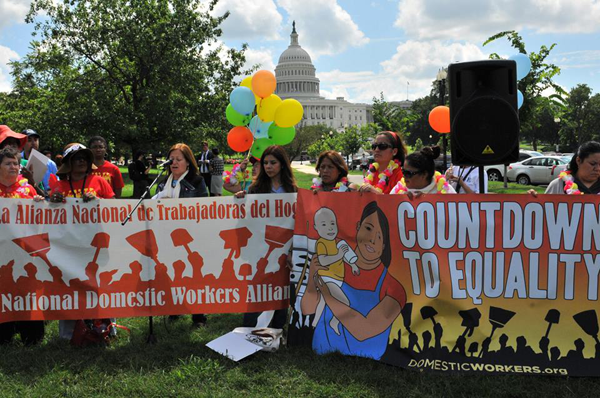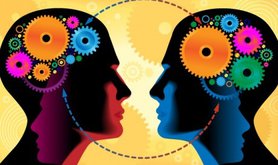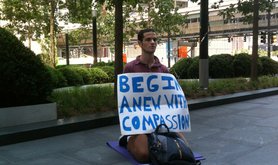
Credit: National Domestic Workers Alliance. All rights reserved.
I was in Seattle the week after George Zimmerman was acquitted of murdering Trayvon Martin, preparing for a gathering to revitalize the movement to end violence against girls and women. In the days leading up to this gathering I heard his name shouted over and over again by protesters in the streets. In the soul-jarring moment of the verdict, it was also my own name that I heard shouted through the bullhorn. Zimmerman had become the personification of racism; the embodiment of the enemy.
In that moment I cringed, and not just because we shared the same name. I began to see something clearly that I had struggled with before. This kind of personification – so emotionally powerful, tempting and cathartic - leads us away from a focus on the culture, structures and processes of racism that the Zimmerman case represents. And that's also the problem with empathy. While it's important to honor the humanity of those whose actions cause great harm, “developing more empathy” is never enough to confront injustice and discrimination. It’s not how much empathy we feel in general terms that really makes the difference, but what we do with the empathy we feel and how we do it in concrete situations.
At the Movement Strategy Center in Oakland, California, we work with groups who wrestle with these issues every day. They have their feet to the fire of injustice, but they eschew simplistic solutions that demonize other people. Instead, they try to confront conflicts from a place of “radical connection:” a mix of unbending honesty about injustice and its causes, balanced by the openness and humility required to understand the motivations of other people and find ways through the forest of competing interests.
Kimi Lee is a good example of what we mean. She is a member of the National Domestic Workers Alliance, a group that brings together housekeepers, care workers, nannies and home health assistants, most of whom are undocumented immigrant women on very low incomes. Sixty-one per cent of live-in domestic workers earn below the minimum wage. Kimi herself is not in that position, but she knows first-hand what it means to care for others in the family with very little help from private insurance companies or the state.
Two days after Kimi gave birth to her first daughter her mother experienced a major stroke, and she was hospitalized in intensive care for the next six weeks. When she came home she needed to be cared for by Kimi and her sister, not to mention requiring their help in navigating $450,000 worth of medical bills for which none of their insurers wanted to admit liability. As a result, her young daughter didn’t see a park for a full six months, Kimi recollected. What the family needed was not more empathy but more support from a better system.
Enter the National Domestic Workers Alliance, which is working to get “Domestic Worker Bills of Rights” passed in every state in an effort to improve their benefits and wages. But instead of demonizing the employers of domestic workers, the Alliance has launched a different approach called “Caring across Generations." This campaign aims to “build bridges” among different groups (including employers) in order to find solutions, instead of “burning them” as was the danger in traditional labor and community organizing. And this is radical connection in action – the ability to confront injustice from a position of shared understanding and responsibility.
Cultivating more empathy among people with different interests and perspectives is certainly one part of this story: as social animals, human beings can mirror the feelings of others without much conscious effort, even if they have radically-different life experiences, values and beliefs. From a social justice perspective this is great news. As Caring across Generations and other campaigns have shown, it means that connections can be built and barriers transcended that might otherwise seem impossible.
But this form of empathy also has its limits. In a recent New Yorker Article, Paul Bloom shows how empathy can become a reflexive, reactive emotion that short-changes the actions and understanding required in the pursuit of social justice. On its own, empathy focuses attention on the story of an individual at the expense of the larger landscape of inequality. Embedding empathy in the individualistic cultures that dominate modern life makes it less likely that people will interrogate the systems, structures and institutions that affect the lives of individuals in different ways. Yet it is this larger landscape that makes it easier for some people to feel and show empathy than others – try it after a twelve-hour day working two shifts at McDonalds, for example. Even worse, these emotions can be manipulated to create support for one group at the expense of another.
That’s why nurturing the courage and conviction to transform these systems is just as important as developing more empathy in ourselves and others. The idea of radical connection captures this combination perfectly. It’s a visceral recognition that we are part of something larger that urges us to act for the whole community’s benefit, and not just for those few individuals with whom we empathize directly.
Sometimes our attraction to empathy may have more to with the fact that it makes us feel good about ourselves. Perhaps it can even screen people from the need to understand the real impact of injustice. But when empathy is experienced as radical connection it can take us to places that challenge our worldviews and our sense of self - places where the pain of separation, oppression and trauma are felt more deeply than any transcendent experience. These places are uncomfortable, but they also act as crucibles for self-growth and for reaching out to others without any sense of paternalism or privilege.
This is a crucial difference between empathy and radical connection, since the latter requires that we be self-critical about our own roles in perpetuating any processes that cause harm to others. If we fail to bear witness to the trauma we feel and the harm we have done; if we fail to galvanize the resources we need to heal ourselves, then we miss the potential for deep transformation. Developing these capacities is essential if empathy is to strengthen our work for social justice.
Many social justice groups use meditation and other personal development practices to cultivate these capacities. For example, the environmental group Forest Ethics attributes their success in building strong relationships with their opponents to their group meditation practice, which helps their staff to advocate for controversial causes without alienating those in government and industry whose support is needed to secure solutions. The group has already achieved success in this way in protecting hundreds of thousands of acres of British Columbian forests. Linked to the core capacity for empathy, these practices allow us to see and feel the humanity of others and to transcend the raw emotions that can block the actions required to promote social justice.
When my neighbor Yansa once asked if I was related to George Zimmerman I laughed. On the surface the answer is obviously “no.” But the honest response has to be more complicated, because we are all embedded in a web of relationships that are held together by both empathy and responsibility: relationships with others who are known and unknown, with those who came before us and those who are not yet born, and with those who share our beliefs and those who don’t.
At the center of his web of relationships stands empathy, but not just that. What carries us through the tides of history with some sense of social justice purpose is radical connection – the ability and willingness to stay with injustice in all of its pain and contradiction, yet still see and grasp the possibilities for loving-hearted action.
Read more
Get our weekly email



Comments
We encourage anyone to comment, please consult the oD commenting guidelines if you have any questions.